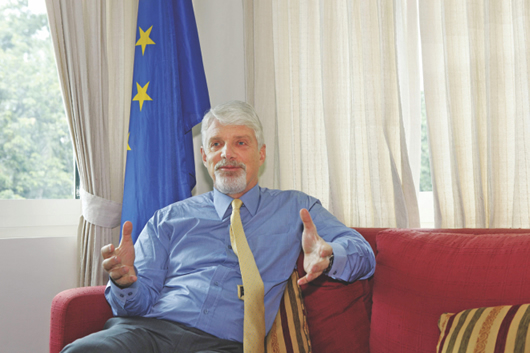
William Hanna – Head of EU in Ghana
Ghana must remove “ghost workers” from its public sector payroll before the European Union resumes budget support suspended a year ago, the EU ambassador to the West African country, William Hanna, said on Tuesday.
EU grants worth up to 200 million euros ($250.14 million) could be crucial as Ghana seeks to recover from a fiscal crisis that has slowed the rapid GDP growth the country enjoyed for years due to its exports of gold, cocoa and oil.
Hanna said the EU suspended aid because of the country’s fiscal problems and any resumption depends on the outcome of government talks with the International Monetary Fund on a financial assistance programme and other factors. An IMF deal could be concluded by February, sources close to the talks said.
But in August, the EU learned of a separate concern involving fake government workers whose presence, along with related problems, inflated the payroll, Hanna said.
“If we are paying for people in Ghana it has to be real teachers, real nurses, not ghost workers,” Hanna told Reuters.
The EU launched a probe to determine the scale of the problem, Hanna said. He welcomed a government decision to address the problem with an inter-ministerial committee.
“The government has to not just address it but deal with it, identify the ghost workers, take sanctions against those who are responsible, remove those names from the list, clean up the database and stop these leakages,” he told Reuters.
Ghana has a large civil service relative to its 25 million population and its wage bill escalated sharply in the election year of 2012 due in large part to a government effort to harmonize public sector salaries.
The rise pushed the budget deficit to 12.1 percent, prompting ratings agencies to downgrade Ghana. In other signs of its macro economic problems, inflation rose to 17.0 percent in November and the currency has fallen sharply since 2013.
The IMF representative in Ghana, Samir Jahjah, said the government has worked since early 2014 to address payroll irregularities. For its part, the government says it has significantly reduced wages as a percentage of revenue.
“Once the remaining details of their medium-term reforms are finalised and external financing assurances from bilateral donors and international institutions are confirmed, a financial arrangement to support Ghana’s economic program would be agreed,” Jahjah told Reuters.
Credit: Reuters























